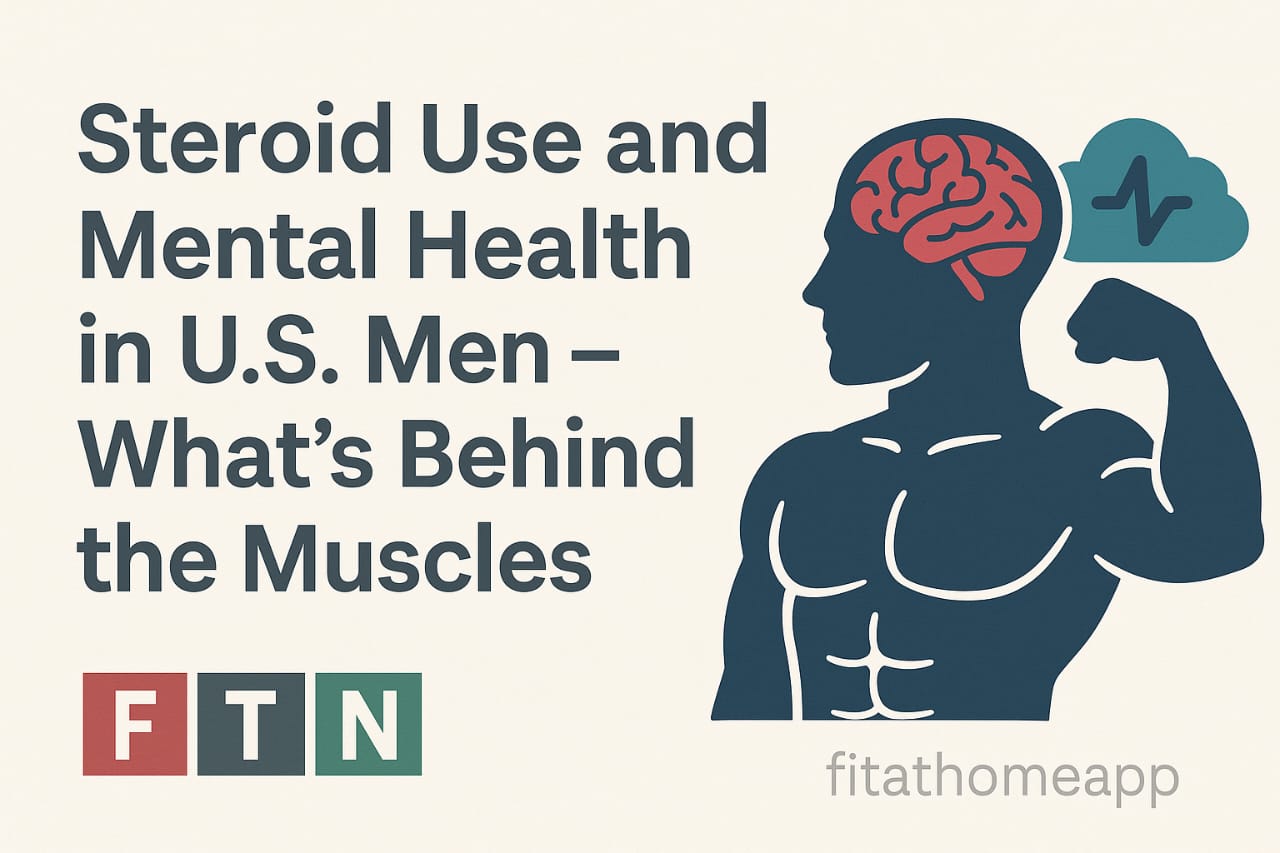In modern American society, where sculpted physiques and peak performance are celebrated, many men find themselves turning to anabolic steroids as a shortcut to strength and confidence. But behind the gains and aesthetics lies a much deeper issue: the complex intersection of steroid use and mental health. From societal pressures to personal struggles with body image, the motivations for steroid use are multifaceted—and the mental consequences are often profound.
📈 Understanding Steroid Use Among American Men
Steroid use has become a growing public health concern in the United States. While the general population reports a 1–3% lifetime usage of anabolic steroids, the rates are significantly higher—sometimes reaching 30%—among athletes, bodybuilders, and fitness influencers.
📊 Who’s Using and Why?
Young men (18–34) are the most affected demographic, often influenced by ideals portrayed on social media and in popular culture.
Caucasian males statistically show higher rates of steroid use compared to other ethnic groups.
Socio-economic factors also play a role. Wealthier individuals may have easier access to steroids, while those from lower-income backgrounds may be more susceptible to peer pressure in competitive environments.
What drives these men? A potent mix of:
Societal ideals of masculinity and attractiveness
The desire for rapid results
A belief that steroids are the only path to elite performance and physical validation
🧠 The Psychological Pull of Steroids
Steroids don’t just enhance muscles—they manipulate perception. In a culture where muscularity is often linked to masculinity, success, and confidence, the psychological lure of steroids is powerful.
📸 The Media Effect
Social media platforms and advertising bombard men with images of chiseled, hyper-muscular bodies—often unattainable without enhancement drugs. These portrayals:
Inflate expectations of the male body
Tie self-worth to physical appearance
Normalize risky behaviors to achieve those looks
🧍♂️ Internal Struggles
Many men who turn to steroids report:
Low self-esteem
Body dysmorphia
A desire to “fix” how they feel on the inside by changing how they look on the outside
For these men, steroids become more than a performance enhancer—they become a coping mechanism.
⚠️ Mental Health Consequences of Steroid Abuse
Steroid misuse doesn’t just come with physical risks—it’s often accompanied by severe psychological side effects.
🧨 Emotional Volatility
Steroid users commonly experience:
‘Roid rage’: sudden, uncontrollable aggression
Irritability, paranoia, or mood swings
Impaired relationships and social isolation
😔 Depression and Anxiety
Ironically, the same steroids that initially boost confidence often lead to:
Crippling depression, especially during withdrawal
Anxiety disorders, linked to body image and social performance
Suicidal thoughts in severe cases
🔁 Long-Term Psychological Impact
Even after discontinuing steroids, many men report:
Ongoing emotional instability
Decreased motivation and self-worth
Increased risk of substance abuse
These long-lasting effects highlight the importance of viewing steroid abuse as a mental health issue, not just a physical or legal one.
💪 Is Muscle Really Linked to Mental Resilience?
There’s a common cultural belief: “The stronger your body, the stronger your mind.” But this ideal, while comforting, is often misleading—especially when muscle is achieved through steroids.
📉 False Sense of Confidence
While steroids might temporarily:
Boost self-image
Elevate social standing
Offer a sense of control
They can also:
Undermine emotional health
Lead to dependency for self-esteem
Create unrealistic standards that are impossible to maintain naturally
The pressure to stay muscular can become emotionally draining, eroding the very resilience men hoped to build.
🧔 Cultural Expectations: Masculinity and the Perfect Body
American masculinity has long been tied to physical dominance and control. Unfortunately, this has created a culture where:
Vulnerability is seen as weakness
Mental health struggles are suppressed
Appearance becomes a measure of self-worth
🗣️ Social Pressure
Men face peer pressure from gym communities, sports teams, and even online forums.
Social media influencers often promote products or “transformations” that encourage extreme behaviors.
Young men, especially teens, are at risk of internalizing toxic expectations.
This creates a dangerous cycle where:
Men are praised for appearance
They turn to unsafe means to maintain it
Their mental health silently deteriorates
🧭 Seeking Support: Mental Health and Steroid Recovery
Getting help shouldn’t be hard—but for many men, it is. The stigma surrounding both steroid use and mental health keeps many from seeking support.
🚫 Common Barriers:
Shame or embarrassment
Fear of judgment from peers or professionals
Lack of awareness that mood swings, depression, or anxiety may be directly linked to steroids
🆘 Where to Find Help:
Primary care physicians for confidential guidance
Therapists specializing in substance-related mental health
Support groups (both in-person and online)
Mental health hotlines and online platforms like NAMI, SAMHSA, or BetterHelp
Building a support system—even starting with one conversation—can be life-changing.
📚 Real Stories, Real Impact
Sometimes, statistics don’t tell the full story. These personal accounts shed light on the emotional costs behind steroid use:
🧍♂️ Jason’s Journey:
A 32-year-old gym-goer who turned to steroids to “level up.” His gains were real, but so were the mood swings, anxiety, and dark lows. After losing friendships and struggling at work, Jason sought therapy and transitioned to a natural fitness lifestyle.
🏋️ Mark’s Struggle:
Former competitive bodybuilder who became obsessed with his image. Steroids brought success—but also eating disorders, obsessive behaviors, and spiraling anxiety. Through counseling, he redefined his relationship with fitness and masculinity.
These stories underscore the truth: behind the muscles, real people are fighting real battles.
🎓 Prevention Through Education and Awareness
We can’t change the culture overnight—but we can start early and speak loudly.
📖 School-Based Education
Teach high schoolers about the dangers of steroid use
Promote body positivity and mental health literacy
Include real-life stories that make lessons relatable
📣 Public Campaigns
Social media initiatives that challenge stereotypes
Community events led by former users, doctors, and counselors
PSAs that redefine strength as vulnerability and self-care
🩺 Healthcare Involvement
Doctors should ask about body image and supplement use during check-ups
Normalize conversations about mental well-being in men
Provide clear, judgment-free paths to treatment
🔚 Conclusion: Rebuilding Strength from the Inside Out
Steroid use among men in the U.S. is not just a matter of muscle—it’s a mirror reflecting deep psychological struggles tied to modern masculinity. While physical appearance often motivates initial use, the lasting effects on mental health are too significant to ignore.
To change the trajectory:
We must dismantle harmful ideals of manhood
Promote mental wellness with the same urgency as physical fitness
Encourage honest conversations—without shame, without judgment
True strength isn’t built with steroids.
It’s built with self-awareness, support, and the courage to ask for help.
🎥 Watch this short but powerful video that explores how steroid use can harm your mind—not just your body:
🎥 My Personal Insight – “Steroids and Mental Health: The Hidden Dangers”
This video cuts straight to the heart of a critical issue: the unseen mental toll of steroid use. It firmly aligns with the article’s message, exposing how pursuit of muscular perfection can backfire psychologically—triggering anxiety, depression, and emotional instability.
I value the way the video presents the human side of the problem—not just physical symptoms, but emotional scars. It would benefit from brief expert voices or real stories of recovery to deepen the impact.
In summary, this video enriches the article by giving readers a chance to pause, reflect, and recognize that real strength begins with mental resilience—not chemical shortcuts.

